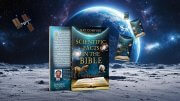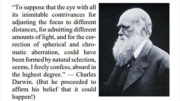For years, we’ve maintained a list of arguments creationists should avoid. There are enough good arguments for biblical accuracy and a young earth that dubious claims can safely be discarded. Now we want to address a similar topic: arguments evolutionists should avoid. These worn-out tropes have not only passed their expiration date, but they never should have been made to begin with.
Argument 1: Evolution is a fact
When our core beliefs are attacked, it’s often easy for humans to retreat to statements such as this: “My belief is a fact, and yours is wrong.”
That’s exactly why we cannot trust mere human understanding to explain the unobservable past—emotion and pride get in the way. Evolution is not a fact, no matter how many times evolutionists say it is. It’s a framework built on assumptions about the past—assumptions that will never have direct, first-hand, observational proof.
Focus in: Hasn’t Evolution Been Proven True?
Argument 2: Only the uneducated reject evolution
Besides the arrogance of such statements, this argument has no footing and should be cast off. Mainly, those who make this claim usually define “educated people” as those who accept evolution. Anyone who disagrees fails the test, no matter what their background (e.g., if we follow this ideology, Isaac Newton must have been uneducated). There are many lists of well-educated scholars who look to the Bible for answers (here’s one)—and we could point out Darwin’s own deficit of formal education (he earned a bachelor’s in theology). But the bigger issue is that education—or lack—does not guarantee the validity of a person’s position.
Focus in: Can creationists be “real” scientists?
Argument 3: Overwhelming evidence in all fields of science supports evolution
The irony, of course, is that for centuries prior to Darwin’s publication of On the Origin of Species, the majority of scientists found the opposite to be true: the “evidence” supported creation. What changed? Not the evidence. Rather, the starting point changed (i.e., moving from the Bible, God’s Word, to humanism, man’s word). Creationists continue to see everything in light of God’s Word and all evidence as supporting the biblical account. In reality, there is no “neutral” starting point; everyone—whether they acknowledge it or not—interprets the “facts” according to a particular way of thinking (i.e., worldview).
Focus in: What’s the best “proof” of creation?
Argument 4: Doubting evolution is like doubting gravity
Why does this argument fail? We’ll show you. Take a pencil or pen. Hold it in the air. Then drop it to the floor. That’s gravity. Next, make a single-celled organism—like an amoeba—turn into a goat. Go ahead. We’ll wait. . . . No? As you can see, there’s a fundamental difference between operational science, which can be tested through repeatable experimentation, and historical science, which cannot.
Focus in: Don’t Creationists Deny the Laws of Nature?
Argument 5: Doubting evolution is like believing the earth is flat
Ironically, the Bible describes the earth as round and hanging in space—long before this could have been directly observed (Job 26:10; Isaiah 40:22). The appeal of this claim is that it stereotypes creationists as stuck in the past, since the common assumption is that people once universally believed the earth was flat before science “proved” otherwise (which wasn’t the case—only a few bought into the idea that the earth was flat). But even if this were true (it’s not), direct, repeatable observation shows us the earth is round and orbiting the sun. Evolutionary stories about fossils are not direct observations; they’re assumption-based beliefs.
Focus in: Don’t Creationists Believe Some “Wacky” Things?
Argument 6: It’s here, so it must have evolved
A conclusion does not prove the premises are true. That is, if the answer is “four,” we could arrive at that any number of ways: 2 + 2, 5 – 1, etc. In the same way, evolutionists often assume that since certain species or traits exist, this is proof of evolution because that’s how it must have happened. This argument, however, is self-reflexive and useless. The Bible offers another (and more sound) framework for how those traits and species came to be.
Focus in: Beginning at the Beginning
Argument 7 Natural selection is evolution
This is likely the most abused argument on the list—and most in need of being scrapped. Often evolutionists bait people into showing them a change that is merely natural selection and then switch to say this proves molecules-to-man evolution. However, this is quite misleading. Natural selection, even according to evolutionists, does not have the power to generate anything “new.” The observable process can only act upon existing characteristics so that some members of a species are more likely to survive. In fact, it’s an important component of the biblical worldview.
Focus in: Is Natural Selection the Same Thing as Evolution?
Argument 8 Common design means common ancestry
Historical common descent is not and cannot be confirmed through observation. Rather, certain observations are explained by assumptions about the past. These observations, we might add, have alternative explanations. Common body plans (homology), for example, do not prove common descent—that’s an assumption. A common Designer fits the evidence just as well, if not better.
Focus in: Comparative Similarities: Homology
Argument 9 Sedimentary layers show millions of years of geological activity
Sedimentary layers show one thing: sedimentary layers. In other words, we can—and should—study the rocks, but the claim that rocks prove the earth must be billions of years old ignores one important point: such an interpretation is built upon a stack of assumptions. When we start from the Bible and examine the rocks within the framework of a global Flood, the need for long ages vanishes.
Focus in: Chapter 4: How Old Is the Earth?
Argument 10 Mutations drive evolution
Perhaps because of movies and fiction, the popular idea is that mutations make evolution go. Given enough time, shifts in the genetic code will produce all the variety of plants and animals on earth—and beyond. The problem? Mutations cannot produce the types of changes evolution requires—not even close. Some may benefit an organism (e.g., beetles on a windy island losing wings), but virtually every time mutations come with a cost.
Focus in: Chapter 7: Are Mutations Part of the “Engine” of Evolution?
Argument 11 The Scopes trial
Misconceptions about the Scopes trial run rampant. Often, accounts sound something like this: Fundamentalist Christian bigots arrested an innocent biology teacher fighting for scientific freedom, and while they won the court case, they ultimately lost the public perception battle to the well reasoned presentation of the defense. Thanks to the play Inherit the Wind, this common—though completely flawed—perception of the event continues to be used against creationists. But real history presents a much different account.
Focus in: Monkeying with the Media and Inherit the Wind
Argument 12 Science vs. religion
News stories thrive on conflict and intrigue, and one common meme presents science and religion as opposing forces—reason struggling to overcome draconian divine revelation. It grabs attention, but it’s bunk. Many atheists and humanists oppose biblical Christianity, but science does not. After all, the truth of a risen Savior and an inerrant Bible puts quite the damper on the belief that God cannot exist. However, science, as a tool for research, works quite well within (and, in fact, requires) a God-created universe. Otherwise, there’d be no reason to do science in the first place.
Focus in: Feedback: Does Science Need God? and Biblical faith is not “blind”—it’s supported by good science
Why address these arguments?
Answers in Genesis wants to show the world that the creation-gospel message and the book that contains it are trustworthy from the first word to the last. We don’t try to hide that. Most of the attacks against the Bible and those who trust in it are based on flawed premises and faulty logic, which is why we point out the arguments above as just a sampling.
Beliefs about the past—and arguments against what God says—have real consequences. If we do demolish such strongholds, it’s because we want as many as possible to experience the fullness of God in Christ.
Get Equipped
DVDs
Books




